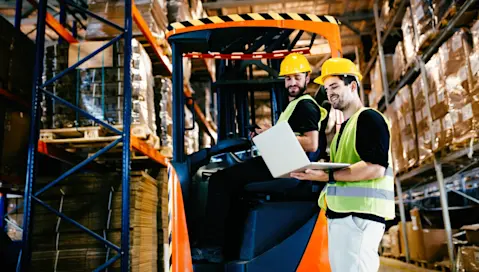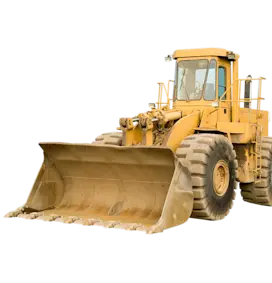Featured in this post
5 Equipment Industry Trends Harnessed With a Tailored ERP
5 Equipment Industry Trends Harnessed With a Tailored ERP
18 Oct 2023
Aptean Staff Writer
Can your equipment and material business thrive in 2024 and beyond? With ongoing global supply chain disruptions leading to increasing market volatility and cautious consumer behavior, it’s critical that you evaluate your digital transformation strategy to ensure your business remains competitive in the future.
The Material Handling Equipment Distributors Association (MHEDA) recently released its 2024 Material Handling Business Trends to encourage industry decision-makers to re-evaluate current processes and solutions given the current market challenges. MHEDA listed 14 trends that will impact material handling and equipment businesses, and many of them can be addressed by implementing robust equipment enterprise resource planning (ERP) software.
ERP is a software system designed to help businesses manage day-to-day operations, from procurement and inventory management to accounting, sales and reporting. Successful material handling and equipment businesses like yours implement equipment ERP solutions to help optimize processes and improve overall operational efficiency.
Discover the equipment industry trends below if you’re considering implementing an industry-specific ERP but don’t know where to start. Continue reading as these could affect the machinery segment where you belong and learn how a robust solution can help.
Trend No. 1: Embracing Emerging Technologies
Equipment businesses have realized that leveraging new technologies can improve daily work processes. While technology like ERP software has proliferated in the market, not all are specifically designed to handle your business’s unique and complicated operations.
If you're still using a generic ERP solution, inefficient workarounds could be necessary because the solution wasn't built with capabilities, workflows and processes for your industry—posing challenges in connection with the prevalent equipment industry trends. The team handling your implementation and ongoing support is also not likely to be an expert in your specific industry sector to be able to address your complex questions and operations.
Takeaway: You Need a Tailored Equipment ERP Solution
To help you streamline business operations, boost sales and manage business growth, your ERP must have these core functionalities that are tailored for the equipment industry:
Equipment lifecycle management
Assembly, manufacturing and logistics
Warehouse, inventory and parts
CRM, reporting and analytics
Financial management
Implementing an industry-specific equipment ERP is a big step in your digital transformation strategy. With this system in place, you’re less likely to have to make costly customizations because it has purpose-built features out of the box.
ERP provides your entire organization with a "single source of the truth", giving you full visibility so you can manage all aspects of your operations including sales, rentals, service and parts.
In addition to the software itself, you’ll also benefit from a team of professionals who are familiar with the equipment and material handling industry and can provide valuable expertise.
Trend No. 2: Prioritizing Cybersecurity
Cyberattacks, as well as other fraudulent activities that damage a company’s reputation and finances, have become rampant over the years. They’re a threat to all organizations. An estimated 30,000 websites are hacked every day, and ransomware attacks happen every 11 seconds.
What’s more, ransomware attacks alone will exceed $30 billion by the end of 2023. That’s a solid indication that equipment businesses need to take cybersecurity risks seriously to prevent financial and reputational damage.
Takeaway: A Cloud-Based Equipment ERP Can Help Mitigate Cybersecurity Risks
Equipment and material handling companies can consider migrating their ERP systems to the cloud to mitigate harmful cyberattacks. With a cloud-hosted ERP, all your data is automatically scanned for cybersecurity concerns with automated checks on IP address activity logs.
Below are some additional benefits of migrating your systems into the cloud:
Robust backup and disaster recovery ensures data security and availability in critical situations.
Advanced threat detection detects and prevents potential security breaches effectively.
Isolation and sandboxing features identify and isolate suspicious activities for enhanced security.
Scalable infrastructure adapts to evolving threats with scalable resources.
Comprehensive access controls efficiently manage user permissions and identity protection.
Consider an equipment ERP that is a SaaS solution built using unique subvertical-specific IP extending the Microsoft Business Central platform, fully within the Microsoft managed cloud to ensure you’re getting cutting-edge technology.
Trend No. 3: Coping With Labor Shortages
You’re not alone if you’re struggling to enlist new talent for your organization. The ongoing skilled labor shortage, in line with prevailing equipment industry trends, is a common challenge for businesses today, including those in the equipment industry.
According to an Associated Equipment Distributors (AED) report, there’s a need to fill 73,000 heavy equipment technician jobs over the next five years. Moreover, 95% of AED member respondents agree there’s a skill gap in the industry with 89% reporting their company is short on qualified workers.
Takeaway: Leverage Automation Features and Mobile Functionalities
Equipment ERP has lots of process automation features and mobile functionalities that can improve efficiency and boost productivity even if your organization has a limited workforce. Now is the time to rethink your digital transformation strategy if your current system doesn’t offer automations for the following processes:
Service
Rental contract management
Warehouse activities
Billing
Sales order management
Inventory management
Accounting
Because equipment ERP is cloud-based, your staff can use their mobile devices to access and collect important data in the field. Dispatchers can even efficiently determine the closest technician available for the job, even if they’re working remotely, via the mobile device location.
Field technicians can leverage their smartphones for real-time updates—capturing before-and-after repair service photos, logging labor time or appending parts to a work order directly from their service van. Additionally, with telemetry devices integrated into your assets, technicians are relieved of the need to physically connect to equipment to access vital data; instead, it's seamlessly uploaded to your system.
Trend No. 4: Market Uncertainty Placing Pressure on Inventory
Material handlers and equipment dealers may struggle to manage inventory effectively if they can’t maintain the right stock levels to meet customer demand. Don’t miss opportunities because you don’t have a system that gives you better visibility of your inventory levels.
And don’t be in a position where you are not able to maximize your finances due to excessive stocks in your inventory that you can’t sell. To remain profitable, you need to be proactive to ensure inventory is being utilized to its full potential.
Suppose your current system doesn’t allow you to have real-time inventory visibility. In that case, you’re heavily relying on guesswork in making business decisions, and you may not know yet that you’re already losing thousands of dollars in revenue.
Takeaway: Utilize Equipment ERP’s Robust Inventory Management Features
The built-in inventory management systems of equipment ERPs provide real-time inventory visibility so you can be proactive in making business decisions. By leveraging real-time data analytics and reports, you can mitigate risks associated with supply chain issues—and all your warehouse data is seamlessly connected to parts, sales, service and rental revenue centers.
Plus, if you’re an original equipment manufacturer (OEM), you can attain a new level of control over your aftermarket replacement parts with tools to handle purchase orders, replenishments, warehouse data and inventory.
An industry-built equipment ERP should have the following inventory management capabilities:
Automated inventory tracking and printing of warehouse cycle-count sheets allow businesses to have a reliable source of inventory data.
Workflow notifications to let employees know when an asset is close to the “return by” date.
Safety stock levels for parts that trigger notifications to procurement to purchase replenishments.
System-generated recommendations to help you determine if you need to transfer parts to other branches with high demand.
Trend No. 5: Recognizing Shifts in Purchasing Dynamics
As the purchasing dynamics in material handling evolve, equipment dealers and manufacturers must explore other avenues like ecommerce to woo prospective buyers. Instead of relying on brick-and-mortar dealerships and rental outlets, buyers and renters of heavy equipment nowadays find it convenient and efficient to use the Internet to compare quotes and dealerships.
That puts the onus on your business to accommodate these consumers if you want to capture your share of the market.
Takeaway: Utilize Ecommerce and CRM Functionalities of ERP
Since more prospective customers are searching online when shopping or leasing equipment, you need to consider implementing a cloud-based equipment ERP with integrated ecommerce and customer relationship manager (CRM) tools. That will enable your employees to improve customer service and target those who prefer using online platforms.
Through CRM, you get real-time insights into sales activities, allowing you to identify profitable leads that your team needs to prioritize. Additionally, your salespeople can leverage opportunity and campaign management tools to help them target prospective customers and find new ways to improve service.
Now is the time to broaden your customer base with an online sales platform. Having an additional outlet can increase your competitiveness without the expense of maintaining a physical store.
With a tailored equipment ERP, it’s possible to integrate an ecommerce solution with functionalities that fit your business model.
Choose a Partner That Offers Tailored Solutions Designed for Your Businesses
Understanding the equipment industry trends is crucial if you want to thrive in the competitive landscape of the machinery dealer business.
Whether you run a material handling or equipment business, having a digital transformation strategy in place is essential, which includes implementing equipment ERP to help you achieve your long-term business goals.
Consider partnering with a solution provider that offers cutting-edge ERP with all the functionalities you need to help achieve your long-term business goals by providing you with insights, increased visibility and control. You may also want to download a free request for proposal to help you determine the tailored solution set your organization needs.
Ideally, a vendor with decades of collective experience shouldn’t only provide you with solutions, but also understand your unique challenges and know your industry end-to-end.
Are you ready to transform your business and stay competitive? Contact our team of equipment ERP experts, today.
Get in touch today to speak to an expert in equipment dealer management
We’ve got the specialised industry software to help your organisation thrive.



